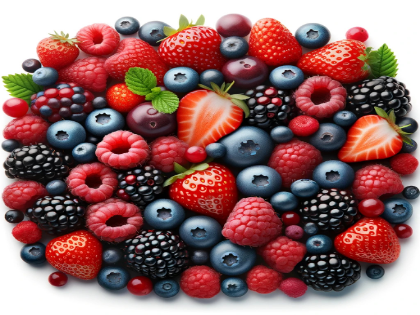How Berries Can Support Your Weight Loss Objectives
Dietary fibre from berries makes you feel fuller for longer. In addition, they are abundant in vitamins and minerals and low in calories. Berries are a delicious addition to smoothies, muesli, and baked goods, whether they are frozen or fresh. They even go well with a green salad. Just give them a good cleaning before consuming.
1. They Aid in Fat Burning
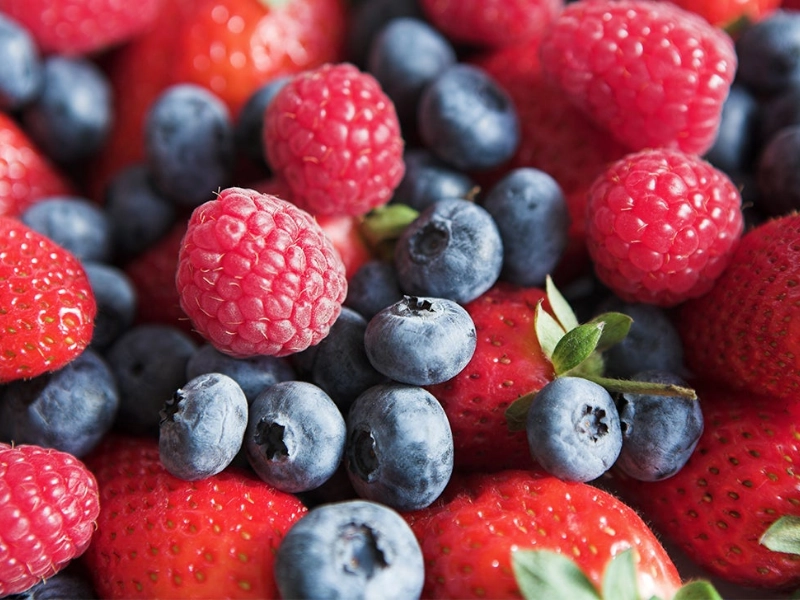
2. They Make You Feel Satisfied
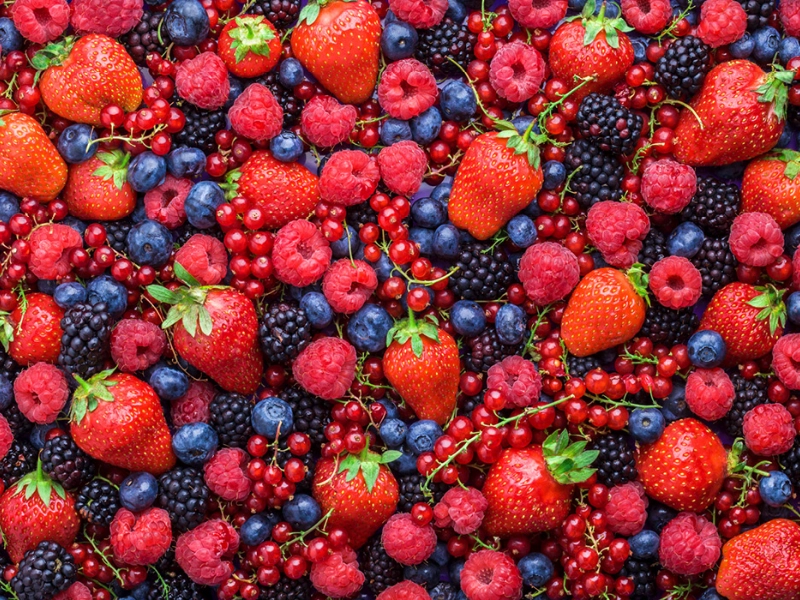 Berries are among the fruits that are highest in nutrients. Rich in antioxidants, they help regulate blood sugar, inhibit systemic inflammation, and slow down the ageing process. [1]
Because these tiny beauties are strong in fibre and low in calories, they can help suppress appetites and encourage weight loss. They also reduce the chance of dementia and heart disease, among many other health benefits.
Due to their abundance in the pigments called anthocyanins, which give them their beautiful blue hue, blueberries are an especially wise option. Studies indicate that these substances have the ability to convert bad white fat into healthy brown fat.
The raspberry is another berry to think about; it provides a nice sweetness without making you feel overly full or sugared. It also contains soluble fibre that maintains your digestive tract in good condition and a natural substance that increases metabolism and decreases body fat overall. They can be blended into a smoothie, eaten as a nutritious dessert with some light whip cream, or added to pancakes, waffles, or oatmeal for breakfast. In the afternoon, they can be used to make a fresh fruit salad.
Berries are among the fruits that are highest in nutrients. Rich in antioxidants, they help regulate blood sugar, inhibit systemic inflammation, and slow down the ageing process. [1]
Because these tiny beauties are strong in fibre and low in calories, they can help suppress appetites and encourage weight loss. They also reduce the chance of dementia and heart disease, among many other health benefits.
Due to their abundance in the pigments called anthocyanins, which give them their beautiful blue hue, blueberries are an especially wise option. Studies indicate that these substances have the ability to convert bad white fat into healthy brown fat.
The raspberry is another berry to think about; it provides a nice sweetness without making you feel overly full or sugared. It also contains soluble fibre that maintains your digestive tract in good condition and a natural substance that increases metabolism and decreases body fat overall. They can be blended into a smoothie, eaten as a nutritious dessert with some light whip cream, or added to pancakes, waffles, or oatmeal for breakfast. In the afternoon, they can be used to make a fresh fruit salad.
3. They promote better sleep.
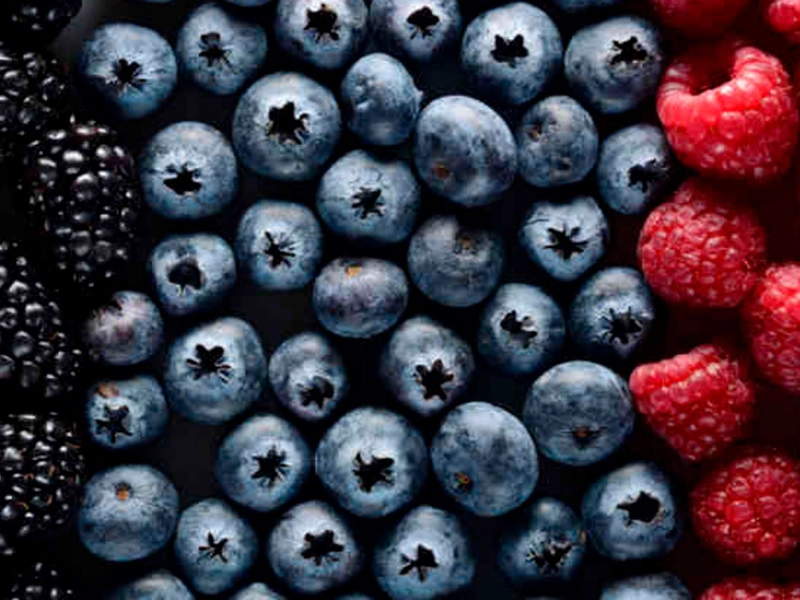 Melatonin, which induces sleep, is released by the brain in response to ellagitannins, the pigments that give blackberries their colour. Deep, peaceful sleep is the outcome. According to a new study, those who consume more blackberries are less likely than non-berry eaters to experience inadequate sleep.
Researchers examined self-reported information from 29,217 participants to determine the impact of berry consumption on sleeping patterns. Additionally, they contrasted diets and eating habits. Findings: Compared to individuals who ate fewer of these fruits, those who ate more strawberries, blueberries, and blackberries were less likely to report having a short sleep duration. Even after accounting for sex, age, and race or ethnicity, this association persisted.
The next time you're yearning for a bedtime snack, pick a bowl of berries rather than a cookie. Berries are nutrient-dense and low in calories. Alternatively, enjoy a glass of tart cherry juice—a well-liked sleep-enhancing beverage. Cherries are high in magnesium and iron, which lower stress levels in addition to melatonin.
Melatonin, which induces sleep, is released by the brain in response to ellagitannins, the pigments that give blackberries their colour. Deep, peaceful sleep is the outcome. According to a new study, those who consume more blackberries are less likely than non-berry eaters to experience inadequate sleep.
Researchers examined self-reported information from 29,217 participants to determine the impact of berry consumption on sleeping patterns. Additionally, they contrasted diets and eating habits. Findings: Compared to individuals who ate fewer of these fruits, those who ate more strawberries, blueberries, and blackberries were less likely to report having a short sleep duration. Even after accounting for sex, age, and race or ethnicity, this association persisted.
The next time you're yearning for a bedtime snack, pick a bowl of berries rather than a cookie. Berries are nutrient-dense and low in calories. Alternatively, enjoy a glass of tart cherry juice—a well-liked sleep-enhancing beverage. Cherries are high in magnesium and iron, which lower stress levels in addition to melatonin.
4. They aid in blood sugar regulation.
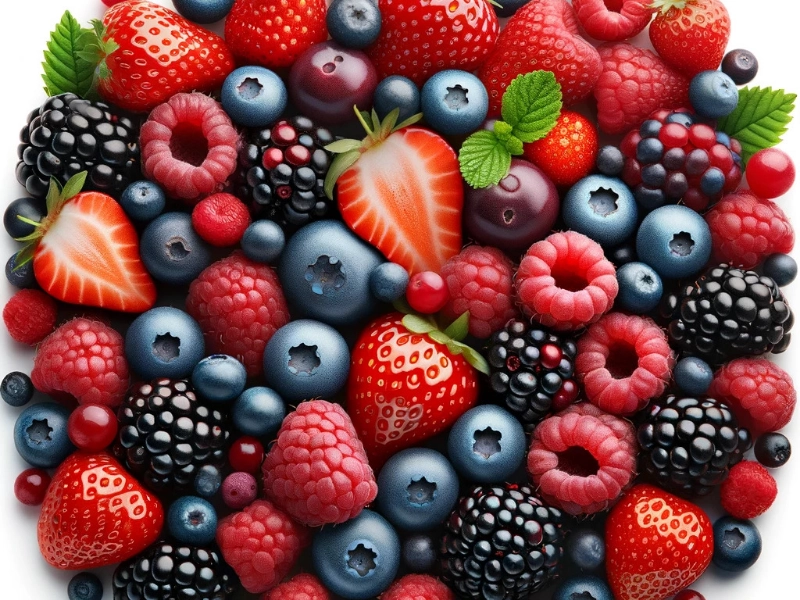 One of the few low-calorie fruits with more than two grammes of fibre, which is essential for a healthy diet, is berries. Fibre helps you feel fuller after a meal and stabilises blood sugar levels by slowing down the digestion process.
Berries are also a great source of many different nutrients that can aid in weight loss and heart disease prevention. Strawberries, for instance, are a great source of vitamin C and, in just one cup, offer about 100% of the daily requirement. Additionally, they are a great source of polyphenols, which have been connected to a lower risk of osteoporosis, neurological illnesses, and cancer.
Berries may also activate "brown fat" cells, which burn calories to create energy rather than retaining them, according to a study. Both total body fat and visceral fat may decrease as a result. This could be the reason behind the reduced BMI observed in individuals who consume blueberries on a daily basis compared to those who do not.
One of the few low-calorie fruits with more than two grammes of fibre, which is essential for a healthy diet, is berries. Fibre helps you feel fuller after a meal and stabilises blood sugar levels by slowing down the digestion process.
Berries are also a great source of many different nutrients that can aid in weight loss and heart disease prevention. Strawberries, for instance, are a great source of vitamin C and, in just one cup, offer about 100% of the daily requirement. Additionally, they are a great source of polyphenols, which have been connected to a lower risk of osteoporosis, neurological illnesses, and cancer.
Berries may also activate "brown fat" cells, which burn calories to create energy rather than retaining them, according to a study. Both total body fat and visceral fat may decrease as a result. This could be the reason behind the reduced BMI observed in individuals who consume blueberries on a daily basis compared to those who do not.




